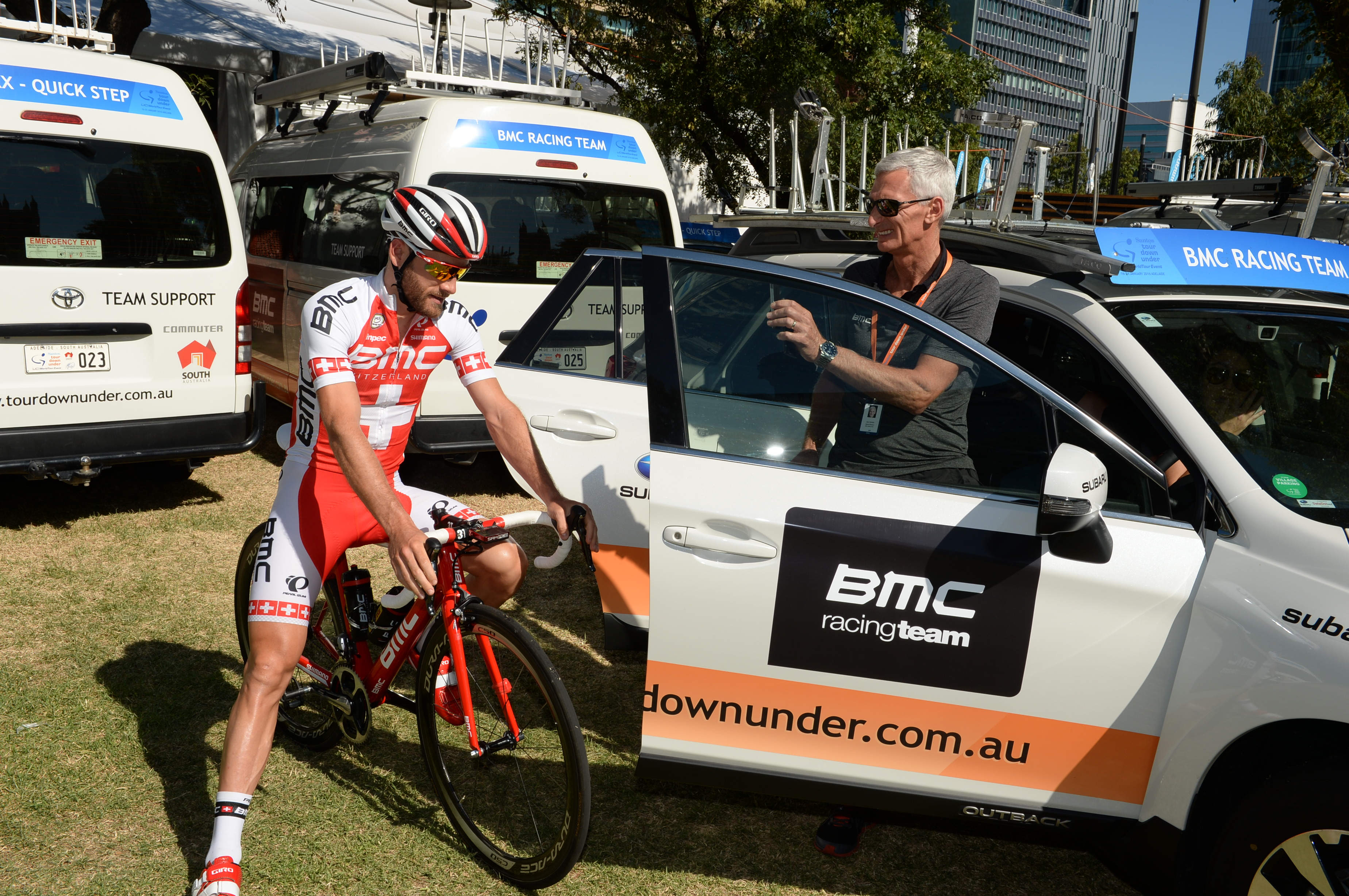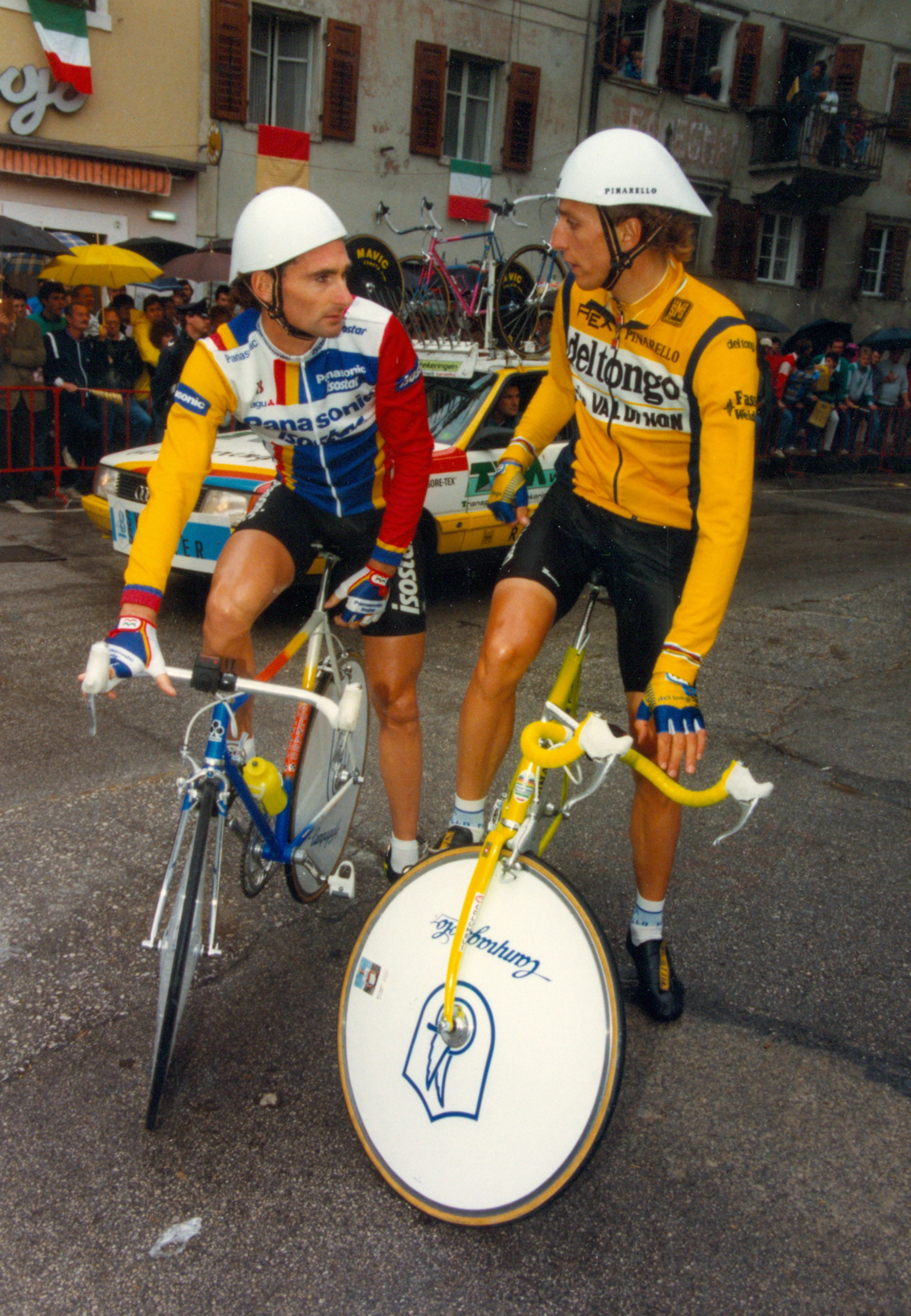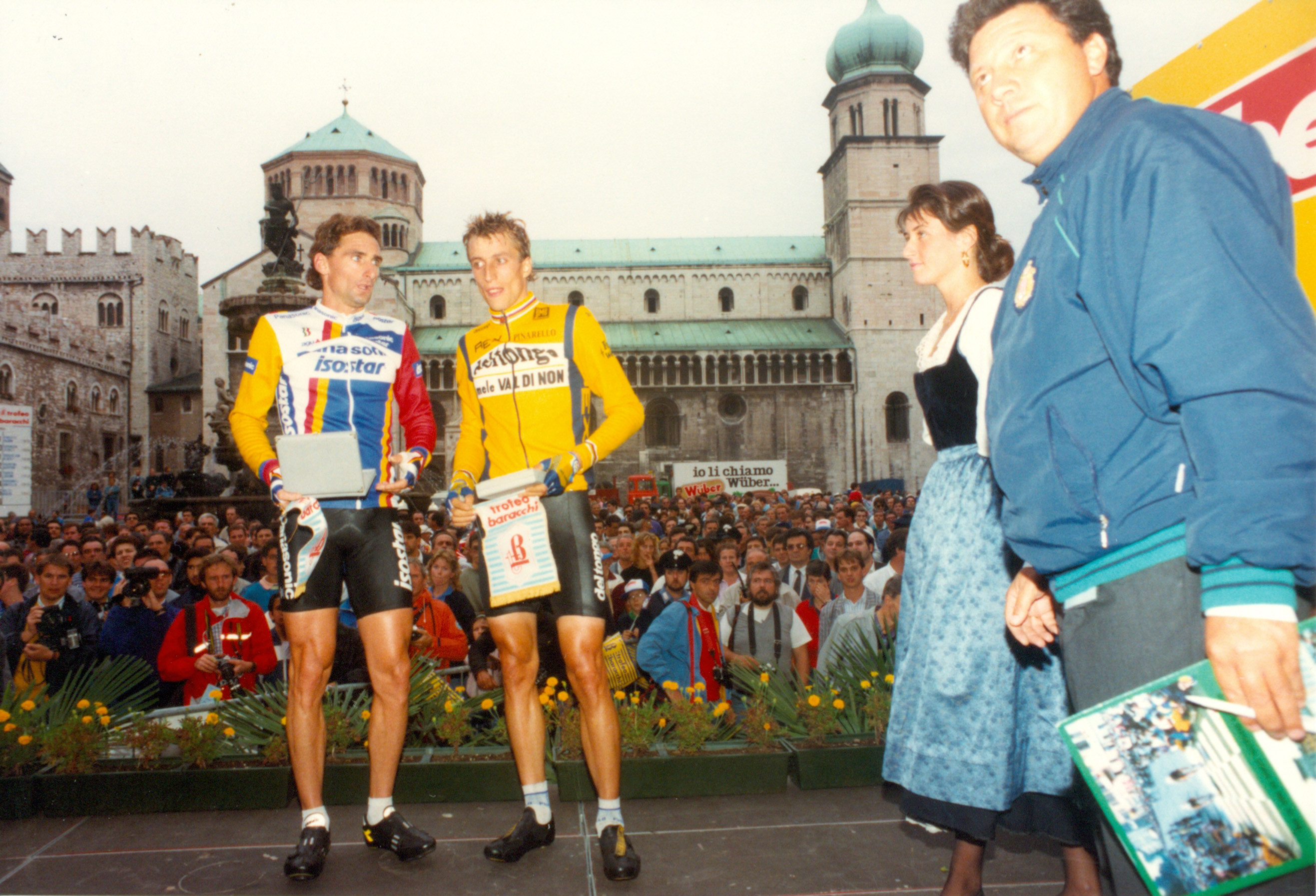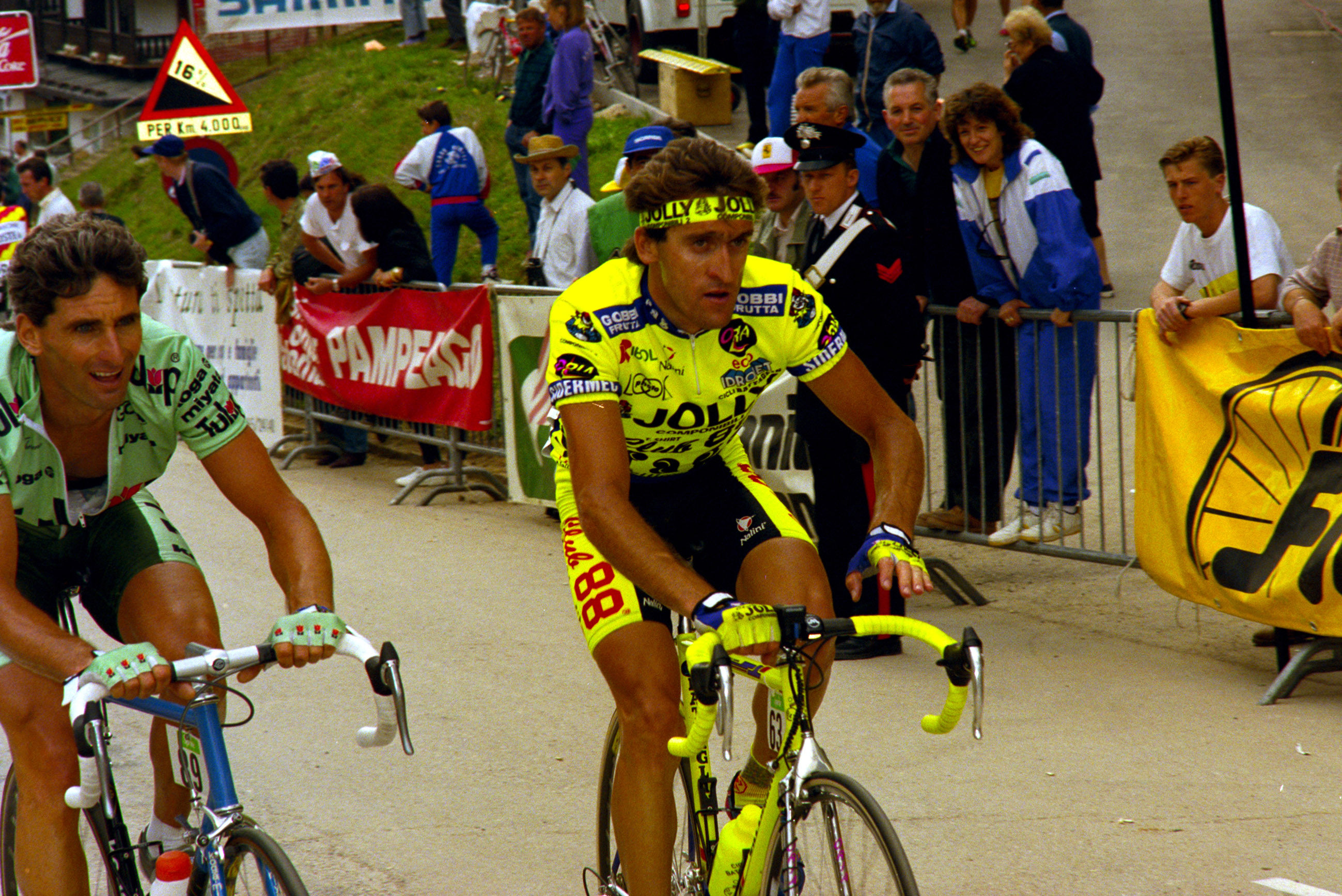Philippa York meets Allan Peiper
25 years since the pair last met, they look back at their careers and how times have changed




Cyclingnews writer Philippa York is at the Tour de Romandie and will be doing a series of articles and podcasts this week. In the first installment, York sat down with former racer turned BMC Racing directeur sportif Allan Peiper to reminisce about the old times.
It's been almost a quarter of a century since we were both at a bike race together, the 1993 TdF to be exact. I was still a rider on the TVM team, racing what would be my final Tour but Allan Peiper was already retired and on the other side of the fence, trying to figure out what was going to replace the highs and lows of racing. It's a situation that comes to most riders because not everyone has the chance or wants to stay involved in the pro cycling world.
The adaption difficulties associated with the end of the athletic career are numerous but the lack of daily focus coupled with no more exercise-induced endorphins can mean a troubling period not only professionally but also in the personal lives of the newly retired. Just what can replace the sensations and passion of racing is a question that you don't or can't deal with until the day comes and pinning on a number is over. Suddenly every day is a grey one, no more excitement, no more adrenaline, and, probably the most difficult to manage, no more adulation.
Institutionalised is maybe too strong a statement for the seasoned professional racer but there's a parallel with soldiers leaving the military and returning to Civvy street. Except they have people easing that transition via various organisations, the ex-rider, rich or poor, famous or not, is all too often left to their own devices.
Philippa York: I don't think I've seen you since 1995. No, 1992.
Allan Peiper: That's right. I stopped in 1992. I might have seen you at a Tour in the first couple of years after I stopped, in maybe 1993 or 1994, because I was doing some work for television then. Which was the Tour when you went the wrong way? Did you go into the deviation instead of the finish?
(laughter from both)
Get The Leadout Newsletter
The latest race content, interviews, features, reviews and expert buying guides, direct to your inbox!
PY: That was 88.
AP: Oh, it was that early.
PY: It was only 30 years ago. Shut up.
AP: Here's the tactician. I just thought I'd bring that one up in case you bring up some tactical questions.
(laughter from both)
PY: And you said you were going to be nice to me.
PY: What did you do when you first stopped?
AP: I did some TV with Channel 4 and then SBS but it was a pretty closed shop. Liggett and Sherwen had it sewn up. There wasn't really much consistency for me and there wasn't enough for a full-time career. I really wanted to get involved with a team but the problem was that the French teams wanted French people and the Dutch teams wanted Dutch people. So, there wasn't really that many opportunities for me. At the time, my ex-wife said to me, 'if you just come into the business with me then we can build it up and have a good life'. I had nothing else to do, so I did that for ten years and worked in fast food, selling hamburgers and hotdogs. It might not seem like a spiritual experience but it was a spiritual experience in that I got to experience that hero-to-zero feeling, and what it was like to work 24 hours straight. I got to feel what it was like to have an identity and then lose it. It was good for getting back into cycling after that because there were no illusions that it was going to last forever.
PY: So it took some time for you to adjust to normal life, and to not just be in cycling?
AP: Yeah, it did. I felt like I was somebody.
PY: I always describe it as being institutionalized, where you're used to having all the adoration that goes with it. You're the bike rider and then it just stops instantly. There's no training and there's no one to say how hard it's going to be to readjust to life. You get chucked in at the deep end and you've not been a normal person for ten or fifteen years.
AP: I must say that I was still lucky in Belgium because the cycling community still afforded me this revered place because I had been a bike rider. Then after ten years of burgers, I split up with my wife and went back to Australia, and I was definitely a zero. I started a new life there but my son was only four years old, and although I had a great trip around Australia and did 36,000 kilometres driving a four-wheel drive, I missed my son. It was a painful experience. So, I came back and worked at the Tour de France doing tours. I started to look for a job and luckily Marc Sergeant backed me as a new directeur sportif at 45 years old. The world had changed by then, the English-speaking world was opening up in cycling. I don't know what Marc was looking for but he wanted to give me an opportunity.
PY: And you took that with both hands.
AP: For sure. It was like a breath of fresh air. I could finally dive into something that I was finally motivated for. Eddy Merckx said, a long time ago 'you spend your whole career doing something you're passionate about 24 hours a day and you spend the rest of your life looking for something to replace that.'
PY: It's hard to replace that.
AP: But if you're in a bike race, up close to the coalface, it's about as close as you can get.
PY: Recently I've seen the last couple of guys talk about retiring, like David Millar, and Fabian Cancellara, and they've talked about the loss of adrenaline and said that there are no more high, just lows and that every day is a grey day. You can see why they struggle with it.
AP: Well sitting in a team car in Paris-Roubaix, or a Tour stage, when you're under pressure, that gets pretty close. When you're driving like you're in a rodeo and going from 6 meters to 2 and can't give an inch….
PY: So you're riding for a position?
AP: Absolutely. They're not the things you do every day. In normal life, you don't get to drive your car on the wrong side of the road, flat sticks, and going over to the breakaway. In the convoy, there's this level of adrenaline that's almost indescribable in normal life.
PY: Did you notice that you had missed that when you hadn't had it for the ten previous years?
AP: For sure.
PY: So you became the teenager again, and were all excited?
AP: Exactly. Exactly.
PY: People have asked me since I've stopped if I would like to be a directeur but in the few races I've followed, I didn't like seeing the guys suffer. When I was racing I didn't realise how much suffering there was, and when I stopped and got in a team car, I could see the guys come tumbling down the hill and they looked like death warmed up. I couldn't have dealt with that. Are you okay with that? Do you know what I'm saying?
AP: I do, I really do, but from my point of view I'm under pressure every day to get results and to push these guys to the limit. I need to make sure that they've done their training; that the performance team are doing their job; that the tactics and scouting are right - and more times than not I could really strangle one of them.
Last week we lost a rider in Paris-Roubaix, Michael Goolaerts, and it's amazing how desensitized we are. There was a lot of talk last week about whether the race should have been stopped. I drove by that kid, and I saw him being treated on the floor. Those things happen every day and you never know how severe or non-severe it is. One of our riders, [Alberto] Bettiol, was in the hospital last night and someone asked me how he was, and I sort of sad 'no idea yet'. Then I heard that he had a broken clavicle and a collapsed lung, and all the rest of it… that's what happens in this sport every day. If you sat down and thought about all the injuries any one pro team has in a year you'd be astounded. We just go past that because it's the job. They know what it takes.
PY: I would have found that hard because I would have looked at them and thought, 'shit' because when I'd follow races there would be crashes, and you'd hear shouting and screaming but it was ones who remained silent who really scared me. I was probably too sympathetic to the rider rather than the result.
AP: And maybe you would have got used to it if you'd had a job where the responsibility meant that you were confronted with it all the time. When I got to the end of Roubaix and heard the news about Goolaerts in the evening, and we had Stefan Küng, who broke both sides of his jaw that day and had to get wired up and operated on, then it resonates with you that you're the protector of the young riders on this team. Even though we push them, you have this sense of responsibility. They're still kids. And it's not just about their sporting performances, but how they act. You could feel what it would have been like to have lost one of your kids that day.
AP: If you look back to when we were racing, we didn't crash as much.
PY: Yes we did.
AP: But Philippa if they crash now then it's a given that they've broken something. If they crash today then the next day they need a new bike. We crashed and we rode with no helmets.
PY: Is it because they're all thinner?
AP: That's a theory that our doctor has. He says that they're too thin and don't rest in the winter. We did running in winter and did some gym work. Now it seems like every crash leads to bones being broken. Did you ever break anything?
PY: No, I always bounced.
AP: I didn't either. They have helmets that withstand so much now.
PY: When we did the Tour and we'd go from racing in France, and then go into Belgium and you went back for your helmet, it was almost this gladiator feel. You'd have your helmet on and you'd feel safe but all you'd have on were these three little straps of leather. It felt like a cloak of invincibility.
AP: But maybe in our day the race wasn't as hectic. Today they start the racing and it's full on. When we started to race, even at the Tour, we'd think 'how the hell did Thierry Marie get twenty or thirty minutes?' That could never happen now!
PY: I fell off that day and almost got eliminated. I caused a giant crash. We were coming up this little hill and I thought 'I'd better move up' and I was going so slowly and rode into this Colombian in front of me. There was this massive crash and me at the bottom. I was probably the only one who didn't break anything. It was the Thierry Marie day. They gave me the spare bike but it was one of the first carbon bikes, with a carbon seatpost. It kept sliding down and I was riding like a frog on this bike I hated anyway. First, I was five minutes down, and then ten, and then I had to start riding.
AP: What year was that?
PY: It was 1991. My contract ran out that year and Legeay wanted to re-sign me the year before. I said 'no I'll take my chances' and I lost. The next year I hurt my neck and did the whole Tour hanging on. When I went to Legeay at the end of the race to see if he would sign me again he said no. Then I went to TVM… the retirement team.
PY: In terms of management style what are you like? Are you a yeller?
AP: No I'm not a yeller. That's changed from our era. Peter Post was like that and he could annihilate you with his tongue.
PY: Well he could try to…
AP: He could put fear into you but you can't do that with the young generation. They're more aware, they're want to know why and understand. It's a bit of a dynamic and there are different ways to put that pressure on without yelling. Last year I was at the Tour of Wallonie with Marco Pinotti and Dylan Teuns was riding for GC, and he had the lead already. A group of 17 riders went up the road and had 45 seconds. Marco got on the radio and said 'guys there's a group of 17 riders up the road with 45 seconds, and I think we need to start riding'. I grabbed the radio, and shouted 'Marco, you if you need to tell them that it's time to ride now, then they shouldn't be professional'. I looked down, thinking it was the DS radio but saw that it was the rider radio and the gap closed within three kilometres.
I have to shoot now, Philippa. It’s the race meeting, but I’ll see you around. Are you here for the race?
PY: I’m here all week. Thanks.
Philippa York is a long-standing Cyclingnews contributor, providing expert racing analysis. As one of the early British racers to take the plunge and relocate to France with the famed ACBB club in the 1980's, she was the inspiration for a generation of racing cyclists – and cycling fans – from the UK.
The Glaswegian gained a contract with Peugeot in 1980, making her Tour de France debut in 1983 and taking a solo win in Bagnères-de-Luchon in the Pyrenees, the mountain range which would prove a happy hunting ground throughout her Tour career.
The following year's race would prove to be one of her finest seasons, becoming the first rider from the UK to win the polka dot jersey at the Tour, whilst also becoming Britain's highest-ever placed GC finisher with 4th spot.
She finished runner-up at the Vuelta a España in 1985 and 1986, to Pedro Delgado and Álvaro Pino respectively, and at the Giro d'Italia in 1987. Stage race victories include the Volta a Catalunya (1985), Tour of Britain (1989) and Critérium du Dauphiné Libéré (1990). York retired from professional cycling as reigning British champion following the collapse of Le Groupement in 1995.
